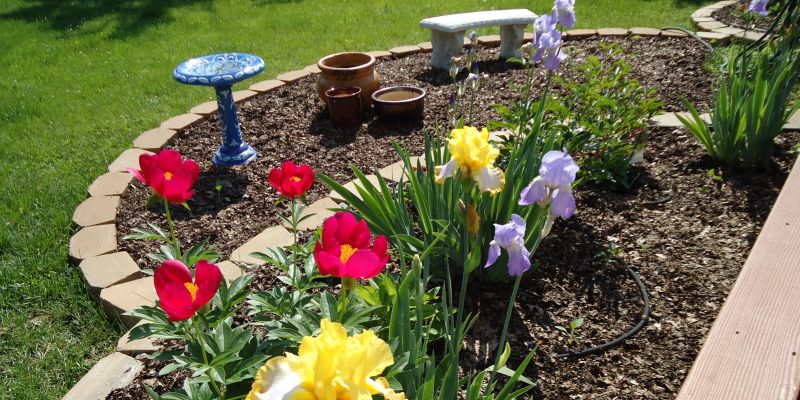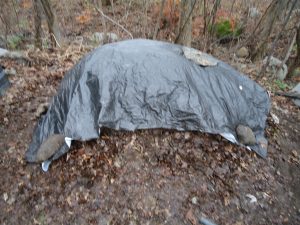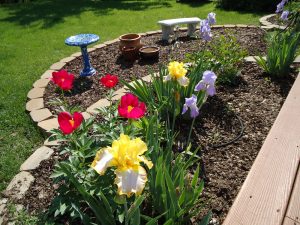
Every fall most of us blow the leaves from our lawns into the woods, and every spring those of us who garden go out and buy mulch. Last fall I changed that pattern and had the folks who mow our lawn blow the leaves into a heap, run them over with the mower a couple of times and pile them near my composting area.

The pile of shredded leaves, bedded down for the winter.
Within a day, a pitch fork inserted into the pile released a serious jet of steam—always a very encouraging sign when composting, but composting was not the goal this time. Fully decomposed organic matter (compost) releases nutrients into the soil, but when leaves are to be used as a mulch they should not be thoroughly decomposed; it will make them less effective in protecting your plants’ roots from heat, cold and wind.
Research indicated that, unlike compost, leaf mulch is ready to be used as soon as you shred it, but it didn’t seem wise to let the leaves do all that cooking and steaming on the roots of my sweet little plants (even though they would steam less when spread out). It takes quite a long time to turn leaves into compost though, so there was no rush. The moistened pile was covered with a tarp and left to sleep for the winter. In the spring, I spread a thin layer of wet newspaper as an extra weed barrier and shoveled barrows full of this wonderous, rich brown shredded material over it. Like peat moss, when released from the weight of its own pile, leaf mulch springs to life and covers a lot of ground. Over the course of the summer, my leaf mulch turned out to be the most moisture-retentive mulch I have used. If there is any down side at all it’s that it is very light in weight; beware of exposed, windy areas.

The ugly duckling transformed in the spring!
If you want to try making leaf mulch, keep the leaves separate from other compostable material and definitely shred them in some way. Unshredded leaves make a slick helmet that prevents air and moisture from reaching your soil. The lawn mower worked well for large quantities, especially with a bagger on the back so the leaves could just be dumped in the pile instead of needing raking afterwards. For smaller quantities, putting batches in a large, plastic garbage pail and processing them with a weed whacker works, too (wear goggles), and if you’ve got a shredder, I’m jealous! Do some research on what types of leaves are OK—maple and oak leaves are ideal but apparently some other types, like evergreen leaves, are not. Finally, keep in mind that leaf mulch retains so much moisture you could risk collar rot if you pile it too closely around the base of your plants.
I’m still figuring out what works and what doesn’t with gardening, but leaf mulch? It’s nature’s perfect answer; a keeper.
